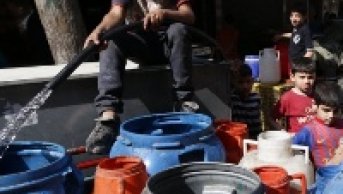The Euphrates – Tigris Basin and Water Problem in Iraq Discussed During the Sulaymaniyah Forum 2014

Ministers, bureaucrats, decision makers, journalists and academicians attended the Second Annual Sulaymaniyah (Sulaimani) Forum, of which the theme was “Navigating Challenges in the Middle East”, hosted by the American University of Iraq in the Iraqi province of Sulaymaniyah on March 4 – 5, 2014. The water issue which is of vital importance following oil and natural gas in the Middle East was discussed on the agenda of the Sulaymaniyah Forum 2014 as it had been during the first Sulaymaniyah Forum held on March 12-13, 2013. Senior officials from Turkey, Syria, Iraq and Iran talked over the security, energy, water, environment and investment issues during this year's Forum which aimed to touch on geopolitical dynamics. On the second day of the Forum, water issue was discussed particularly within the scope of the Euphrates and Tigris rivers and as an instrument for cooperation across the region.
Virginia Tice from Nature Iraq Foundation, Azzam Alwash from Nature Iraq, Andrea Cattarossi, Mukhtar Hashemi from NIReS (Newcastle Institute for Research on Sustainability) and Monadel Fadel Al Mahdawi from Iraqi Ministry of Water Resources attended the water session of the forum, also known as the Davos of the Middle East. The issues that came to the fore and discussed during the session can be summed up as follows;
- Above all, planning of water resources in Iraq and its environmental aspect are being neglected in plans.
- There is a 50% water loss stemming from both mismanagement and transfer problems of water in Iraq. (Andrea Cattarossi says there is a loss of 70 percent.) The 87% of water resources in Iraq is used for agricultural irrigation, which the biggest loss of water comes from. Use of modern irrigation techniques in agriculture would make an outstanding contribution to water saving, but there are technical and financial insufficiencies in Iraq in this respect. Iraq needs cooperation and support in order to deal with the water problem particularly in this regard, as well as in general.
- Without measures taken on management of water resources and water saving, a major water problem will prevail in Iraq within the next 7-10 years. In terms of water saving, the public opinion must be informed on the fact that water is not an inexhaustible resource.
- 2-3 percent of water resources in Iraq have been used for oil drilling.
- 2 percent of agricultural lands in Iraq have been lost due to desertification.
- There are major losses in data regarding water resources in Iraq. It is necessary for Baghdad and Erbil to work in coordination to create a consistent data source.
- Three million dollars have been spent to fix the Mosul Dam, and no result could be obtained so far. Experts suggest that such works should be put aside, and new projects must be focused on in terms of time and finance.
- According to the attendants, water use in Iraq's Kurdistan Regional Government (KRG) is twice – three times more than the amount of water used in Europe.
- 40 dams are envisaged to be built in the Kurdistan region. But also integrated management of water resources must be taken into consideration while planning the aforesaid dams.
- There have not been large-scaled plans on rivers and water shortage in the Kurdistan region. Authorities should take lesson from the past. New constitution and reforms are needed on water for developments especially in agricultural sector. While making plans on water, also climate change and its impacts must be given priority.
- The possibility that water could become a political instrument between Iraqi Kurdistan and Baghdad is a concerning situation. While KRG uses water as a political pressure tool during the budget talks with Baghdad, KRG imposes restrictions on water that flows into Baghdad and the south from time to time as they did last week. Another issue mentioned during the session was the hydrogeological link between KRG's highlands that receive the most rainfall and the marshlands located in the south
- Water issue has been associated with the issue of trust between Turkey – Syria and Iraq. The founder of Nature Iraq Azzam Alwash suggested that the questions such as; “who is the owner of water?” or “who uses water most?” should be put aside and regional cooperation must be focused on. Besides, Alwash made another suggestion: He put forward the idea of storing Iraq's waters in Turkey where it is more convenient to construct dams in geographic terms. Furthermore, it was pointed out that water is not dividing but a uniting factor; and it was asserted that water must be used as an instrument to improve diplomatic relations.
Iraq has used the water issue as a political instrument in its domestic and foreign politics by regarding Turkey as responsible for the water problems prevailing in the country both in the international events and media. Given the aforesaid session that took place on that day, the fact that the specialists in Iraq have been handling the water issue in all aspects with a rational and solution-oriented approach for some time now is a promising development.









